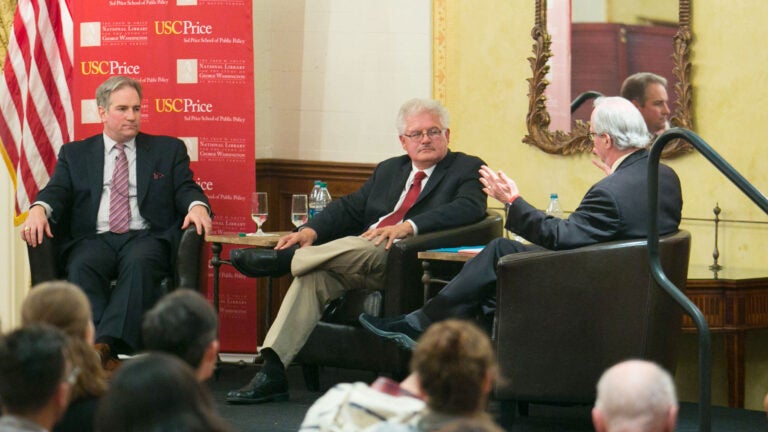
Moderator David Sloane, right, poses a question to George Sanchez and Douglas Bradburn, left, during the George Washington Leadership Lecture. (Photo/Tom Queally)
Immigration: It’s an issue as old — and complex — as U.S. history
The thorny presidential campaign topic evoked controversy as far back as George Washington’s administration
Immigration seems like a modern challenge, but many of the issues now being debated by presidential candidates regarding immigration and naturalization policies were topics considered by the nation’s first president.
The USC Price School of Public Policy and the Fred W. Smith National Library for the Study of George Washington delved into a historical perspective on immigration and its influences on present-day discussions during the George Washington Leadership Lecture on Jan. 27.
“These events explore President Washington’s lifelong accomplishments, providing a better understanding of him as a person but also a better understanding of his remarkable leadership, professional achievements and, of course, his lasting legacy,” said USC Price Dean Jack H. Knott about the lecture series, which were established through a gift by Maribeth Borthwick ’73, who also serves as the vice regent for California of the Mount Vernon Ladies’ Association.
[Just as we do today, they were concerned with the challenge of balancing inclusiveness, economic growth, social justice and national security.
Jack H. Knott
“When George Washington held office,” Knott added, “the country grappled with immigration and naturalization policies. Just as we do today, they were concerned with the challenge of balancing inclusiveness, economic growth, social justice and national security.”
USC Price Professor David Sloane led the night’s conversation at USC’s Town and Gown ballroom featuring Douglas Bradburn, founding director of the library, and USC Dornsife College of Letters, Arts and Sciences Vice Dean and Professor George Sanchez, a leading historian.
‘Nation of immigrants’
“We talk about George Washington as the father of the nation, and we talk about this being a nation of immigrants,” Bradburn said. “We rarely put the two together, but what I want to suggest is that’s the correct way to think about his relationship to the challenge of immigration — he was the father of a nation of immigrants.”
Bradburn explained that Washington was surrounded by immigrants his whole life, from mentors to business partners to in-laws. During his presidency, one-quarter of Washington’s cabinet was foreign-born.
He called for the first laws related to the naturalization of immigrants in two of his State of the Union addresses. The Naturalization Act of 1790 was informed by perceptions of the positive economic benefit of immigrants and the notion of America as a land of religious liberty. It established a two-year waiting period before immigrants could become citizens; and although the policy was progressive for its time, naturalization was limited to the same white European males who founded the country.
“By limiting citizenship in the new nation to aliens who were ‘free white males’ ‘of good moral character,’ these British aliens and children, grandchildren and great grandchildren of aliens built into one of its first laws that contradictory relationship between character and biology that continues to mark our current debates,” Sanchez said.
It didn’t take long for the first ill will toward immigrants to develop in the new country, Bradburn noted. The French Revolution unleashed an international refugee crisis on the young republic, with many of the people showing up at American ports being impoverished or considered dangerous radicals.
The Naturalization Act of 1795 lengthened the residency requirement to five years, required citizens to renounce titles of nobility and take an oath to support and defend the constitution of the United States while denouncing allegiance to foreign jurisdictions. This remains an aspect of the oath immigrants take for citizenship, one that no other country requires, Bradburn said.
Evolution of immigration policy
Sanchez explained that immigration by land did not become a concern until the Immigration Act of 1924 created the modern border patrol. Federal officials focused more on managing the southern border based on labor needs than stopping undocumented entry, particularly during World War II — helping establish economic ties for immigrants.
He called the 11 million undocumented immigrants of today a direct result of this long-standing commercial relationship, combined with the Immigration and Nationality Act of 1965, which for the first time put Mexican migration on a quota.
Sanchez placed a human face on the immigration issue in student Karla Martinez, whose parents brought her to this country without documents when she was an infant. Martinez, now a senior at USC, has traveled a difficult road toward earning her degree.
“Individuals like Karla Martinez to me represent the true possibility for a new America in which civic participation and community commitment, not racial background or legal status, determines one’s place in U.S. society,” Sanchez said of Martinez, who recently interned in Mayor Eric Garcetti’s office at City Hall
During his remarks, Sloane pointed out how even today’s discourse on immigration has been shaped by Washington’s legacy.
“The remarkable thing about George Washington is that he lived a really long time ago,” Sloane said, “yet we can sit here and have a conversation about an issue that is front and center in our election, and we can’t escape him.”



